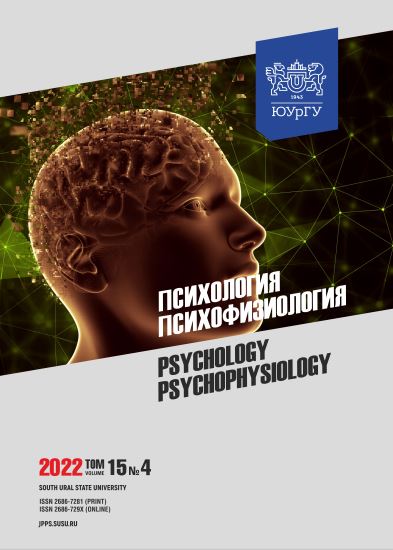Features of Internet addiction and time spent on the Internet among students from different regions of Russia
Abstract
Background: the active use of Internet resources combined with relative personal autonomy and the immaturity of personal and psychophysiological structures creates increased risks for Internet addiction in adolescents. Aims: the paper aims to identify the features of the structure of Internet addiction and its relationship with time spent on the internet among students from different regions of the Russian Federation. Materials and methods: the sample consisted of 134 high school students (aged from 16 to 17 years)
living in Arkhangelsk, Nadym, and Simferopol. The Chen Internet addiction scale (modified by K.A. Feklisov, V.L. Malygin) and a questionnaire aimed at identifying the time spent on the Internet were used, as were the following methods of statistical processing: one-factor analysis of variance (ANOVA), the Newman–Keuls test, and the Spearman rank correlation coefficient. Results: a general pattern has been revealed as being associated with a greater severity of individual symptoms of Internet addiction and time spent on the Internet in children from the northern region compared with those from the southern region; students of Simferopol exhibit a linear correlation between Internet addiction and time spent on the Internet compared with students of Arkhangelsk or Nadym. Conclusion: adolescents living in the Northern and Southern regions of Russia demonstrate features of Internet addiction, which result in a different response to a potentially addictive agent. The critical value of the time spent on the Internet, after which this factor causes a pathogenic effect, will be different between the groups due to different individual typological reactions to aggravating climatic and geographical conditions.
Downloads
References
2. Goldberg I. Internet addiction disorder (IAD). Social and Behavioral Sciences. 2015;191:1372–1376. DOI: http://doi.org/10.1016/j.sbspro.2015.04.292.
3. Voiskunskii A.E. Current problems of the psychology of Internet addiction. Psikhologicheskii zhurnal = Psychological Journal. 2004;25(1):90–101. (in Russ.).
4. Malygin V.L., Khomeriki N.S., Smirnova E.A. Internet-dependent behavior. Zhurnal nevrologii i psihiatrii = Journal of Neurology and Psychiatry. 2011;8:86–92. (in Russ.).
5. Orzack M.H. Computer addiction: What is it? Text. Psychiatric Times. 1998;15(8):34–38.
6. Malygin V.L., Homeriki N.S., Merkureva Yu.A., Iskandirova A.S., Pahtusova E.E. Bio-psycho-social model of Internet-addiction behavior in adolescents. Risk factors and principles of therapy. Nevrologicheskii vestnik. Zhurnalim = Neurological Bulletin. 2017;49(1):88–90. (in Russ.).
7. Park B., Han D.H., Roh S. Neurobiological findings related to Internet use disorders. Psychiatry and Clinical Neurosciences. 2017;71(7):467–478. DOI: http://doi.org/10.1111/pcn.12422.
8. Yoo H.J., Cho S.C., Ha J. et al. Attention deficit hyperactivity symptoms and Internet addiction. Psychiatry & Clinical Neurosciences. 2004;58:487–494. DOI: http://doi.org/10.1111/j.1440-1819.2004.01290.x
9. Trumello C., Vismara L., Sechi C. et al. Internet Addiction: The Role of Parental Care and Mental Health in Adolescence. International Journal of Environmental Research and Public Health. 2021;18. URL: https://doi.org/10.3390/ijerph182412876 (accessed: 14.04.2022).
10. Molchanova L.N., Ilina V.V. Features of the relationship between social intelligence and the propensity for Internet-dependent behavior in medical university students // Izvestiya Yugo-Zapadnogo gosudarstvennogo universiteta. Seriya: Lingvistika i pedagogika = Proceedings of the Southwestern State University. Series: Linguistics and Pedagogy. 2019;9(2.31):170–184. (in Russ.).
11. Lopez-Fernandez О. Problematic Internet use in British adolescents: An exploration of the addictive symptomatology. Computers in Human Behavior. 2014;35:224–233. DOI: http://dx.doi.org/10.1016/j.chb.2014.02.042
12. Korolenko С.P. Psihofiziologiya cheloveka v ekstremalnyh usloviyah [Human psychophysiology in extreme conditions]. Leningrad, Medicina. 1978:272. (in Russ.).
13. Panin L.E., Sokolov V.P. Psihologicheskie vzaimootnosheniya pri hronicheskom emocionalnom napryazhenii [Psychological relationships with chronic emotional stress]. Novosibirsk, Nauka. 1981:176. (in Russ.).
14. Krivonogova E.V., Krivonogova O.V. Poskotinova L.V. Individual-typological features of the reactivity of EEG rhythms, cardiovascular system and lactoferrin level in the conditions of general air cooling of a person. Fiziologiya cheloveka = Physiology cheloveka. 2021;47 (5):67–76. (in Russ.)
References on translit
-Copyright (c) 2022 Psychology. Psychophysiology

This work is licensed under a Creative Commons Attribution-NonCommercial-NoDerivatives 4.0 International License.



